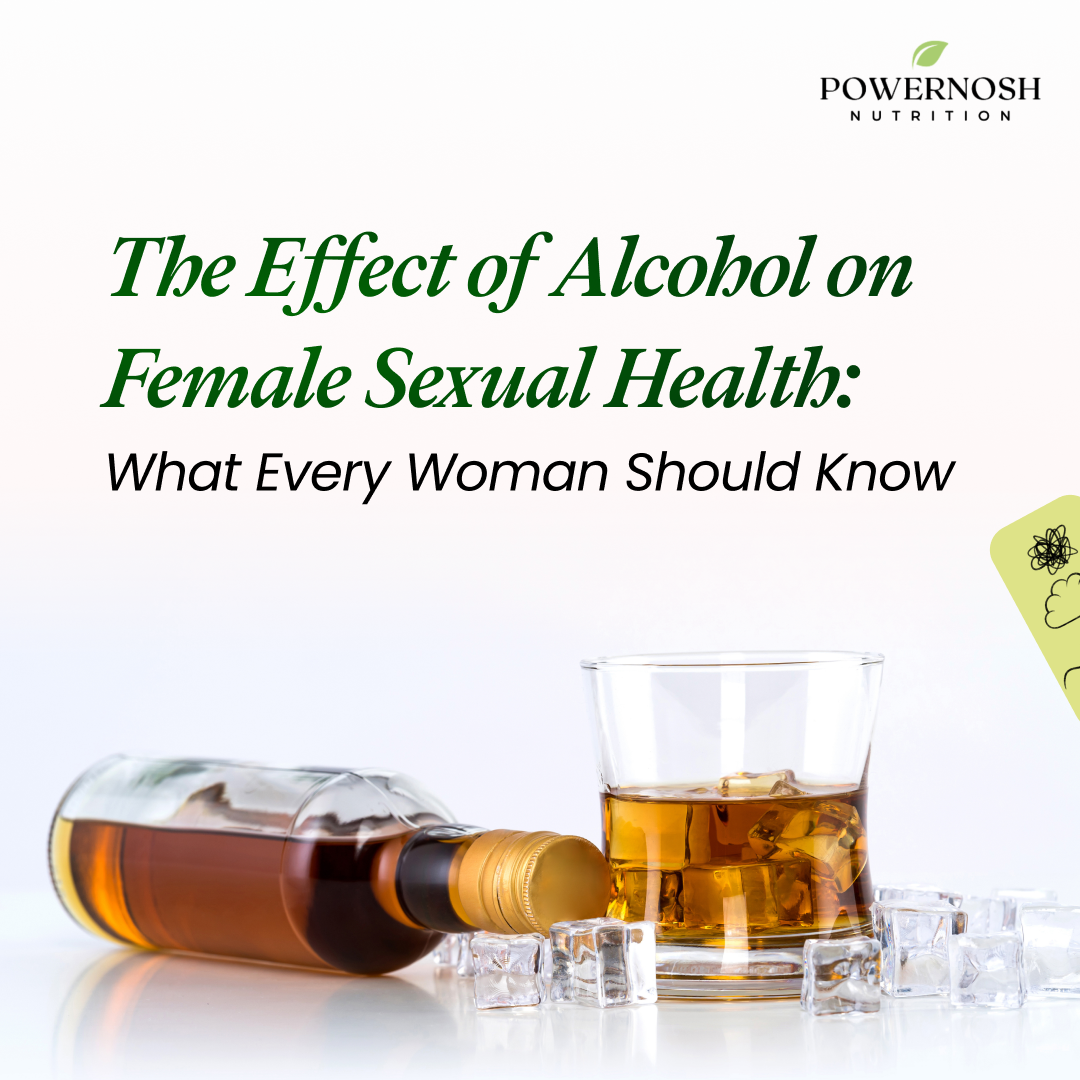
How Alcohol Affects Women’s Sexual Health | PowerNosh Guide
Share
Introduction
A glass of wine at dinner, cocktails on the weekend—for many women, alcohol is a regular part of life. While moderate consumption may seem harmless or even socially empowering, the reality is that alcohol has a deeper impact than we often acknowledge—especially when it comes to female sexual health.
From hormonal imbalances and reduced libido to emotional changes and fertility challenges, alcohol plays a complex role in a woman’s physical and emotional intimacy.
At PowerNosh Nutrition, we believe in empowering women with knowledge, tools, and clean wellness products that support vibrant health at every stage. In this article, we unpack the truth about how drinking affects female sexual wellness—and what you can do to support your body in reclaiming balance.
1. Alcohol & Hormonal Imbalance
Your hormones govern almost every part of your reproductive system—from your menstrual cycle to your desire for intimacy. Alcohol disrupts the endocrine system, interfering with the production and regulation of key sex hormones such as:
- Estrogen: Can fluctuate unpredictably with alcohol intake
- Progesterone: May decrease, leading to irregular cycles
- Testosterone: Though present in smaller amounts, it plays a vital role in libido
Excessive drinking can throw off this delicate balance, often resulting in menstrual irregularities, reduced vaginal lubrication, and unpredictable mood shifts, all of which can directly affect sexual experiences.
2. Reduced Libido & Sexual Desire
While alcohol is often seen as a confidence booster or "mood enhancer," research shows that its long-term effects are the opposite. Here's how:
- Alcohol initially lowers inhibitions but depresses the central nervous system, reducing overall arousal
- Regular alcohol consumption leads to lower dopamine and serotonin levels, both essential for sexual desire and motivation
- Chronic use may even reduce the sensitivity of erogenous zones over time
Women who consume alcohol regularly often report feeling a disconnect between the mind and body when it comes to sexual activity.
3. Arousal, Lubrication & Orgasmic Function
Alcohol not only dampens mental desire—it also has a physiological effect. Studies show that women under the influence of alcohol experience:
- Delayed or decreased vaginal lubrication
- Reduced genital blood flow, which can make arousal and orgasm more difficult
- Increased chance of pain or discomfort during intercourse
These effects can make sexual activity less pleasurable, reinforcing a negative feedback loop that decreases future desire.
4. Emotional & Psychological Impact
Sexual health isn’t just about physical function—it’s deeply connected to mental well-being. Alcohol is a known depressant that alters mood and emotional regulation.
- Anxiety and depression, both linked to low libido, are more prevalent among frequent drinkers
- Alcohol can lead to low self-esteem, poor body image, and relationship strain
- Long-term consumption is associated with emotional numbing, which affects intimacy and connection
Emotional health is key to feeling safe, present, and connected—all of which are essential for fulfilling sexual experiences.
5. Impact on Fertility & Reproductive Health
Alcohol affects more than desire. It can interfere with ovulation, egg quality, and implantation, impacting fertility. Here’s how:
- Heavy drinking disrupts follicle development and ovulation
- Increased risk of polycystic ovary syndrome (PCOS) and hormonal imbalances
- Higher likelihood of complications during pregnancy and increased risk of fetal alcohol syndrome
Even moderate drinking has been shown to negatively affect conception efforts. For women trying to conceive, it’s important to minimize or avoid alcohol altogether.
6. How to Reclaim Balance & Sexual Wellness
The good news? You have the power to restore balance to your body and support healthy sexual function. Here are practical steps to help:
Limit Alcohol Intake
- Consider setting boundaries on how often and how much you drink
- Switch to alcohol-free social alternatives or limit to special occasions
Focus on Nutrition & Hydration
- Eat foods rich in omega-3s, antioxidants, magnesium, and B vitamins
- Stay hydrated to support hormone regulation and tissue health
Improve Sleep & Movement
- Poor sleep disrupts sex hormones. Prioritize 7–9 hours/night
- Exercise improves blood flow and boosts feel-good neurotransmitters
Support with Targeted Supplements
Support your body with clean, plant-based supplements designed to promote hormonal harmony, reduce stress, and support sexual wellness.
Recommended Products from PowerNosh Women’s Health:
- Glow: For radiant skin, improved blood flow, and confidence-boosting benefits
- Balance: Supports hormonal regulation, reduces PMS symptoms, and promotes mood stability
- Desire: A focused blend designed to enhance libido, arousal, and vitality
These supplements are:
- Plant-based
- Gluten-free & sugar-free
- Clinically inspired and safe for daily use
Conclusion
Alcohol's impact on female sexual health is often underestimated. While a glass of wine now and then may feel relaxing, regular or excessive drinking can disrupt hormones, dampen desire, and affect emotional connection.
The first step is awareness. The next step is support. By making mindful lifestyle choices and giving your body what it truly needs, you can reclaim your confidence, libido, and well-being.
At PowerNosh Nutrition, we’re here to walk with you on that journey.
💼 Explore the full Women’s Health Collection to support your vitality from within.

